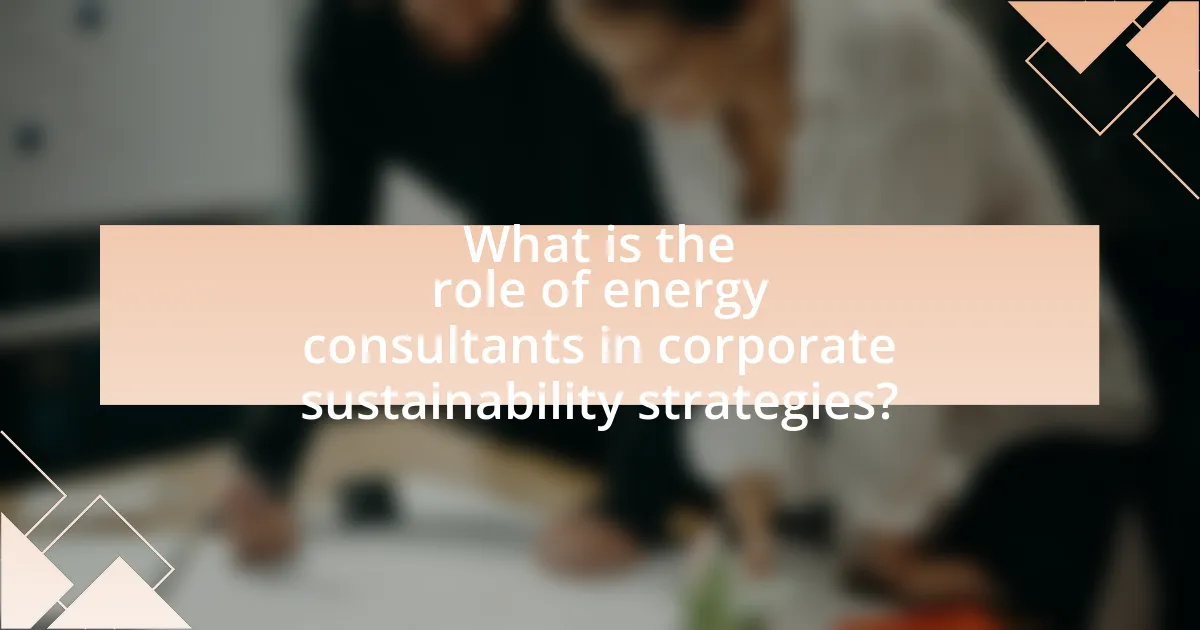Energy consultants are integral to corporate sustainability strategies, offering expertise in energy efficiency, renewable energy integration, and regulatory compliance. They conduct energy audits to assess usage patterns, identify inefficiencies, and recommend sustainable practices that can lead to significant cost savings and reduced carbon footprints. By helping organizations navigate complex regulations and develop actionable sustainability plans, energy consultants enable companies to align their operational goals with environmental responsibilities. The article explores the specific services provided by energy consultants, the challenges companies face in implementing sustainability strategies, and the emerging trends in energy consulting that enhance corporate sustainability efforts.

What is the role of energy consultants in corporate sustainability strategies?
Energy consultants play a crucial role in corporate sustainability strategies by providing expertise in energy efficiency, renewable energy integration, and regulatory compliance. They assess a company’s energy usage, identify opportunities for reducing consumption, and recommend sustainable practices that align with corporate goals. For instance, a study by the International Energy Agency indicates that implementing energy efficiency measures can reduce energy costs by up to 30%, significantly contributing to a company’s sustainability objectives. Additionally, energy consultants help organizations navigate complex energy regulations and incentives, ensuring compliance while maximizing financial benefits. Their guidance enables companies to develop actionable sustainability plans that not only reduce environmental impact but also enhance overall operational efficiency.
How do energy consultants contribute to corporate sustainability goals?
Energy consultants contribute to corporate sustainability goals by providing expertise in energy efficiency, renewable energy integration, and sustainability assessments. They analyze a company’s energy consumption patterns and identify opportunities for reducing waste and optimizing resource use, which can lead to significant cost savings and lower carbon footprints. For instance, a study by the International Energy Agency found that energy efficiency measures can reduce energy consumption by up to 30%, directly supporting sustainability objectives. Additionally, energy consultants help organizations develop and implement strategies that align with regulatory requirements and industry standards, ensuring compliance while promoting sustainable practices.
What specific services do energy consultants provide to corporations?
Energy consultants provide corporations with services such as energy audits, energy management strategies, renewable energy integration, regulatory compliance assistance, and sustainability reporting. These services help corporations identify energy inefficiencies, reduce costs, and meet sustainability goals. For instance, energy audits assess current energy usage and recommend improvements, while renewable energy integration involves advising on the adoption of solar, wind, or other sustainable energy sources. Additionally, consultants assist in navigating regulations related to energy use and emissions, ensuring compliance with local and national laws. They also support corporations in preparing sustainability reports that communicate their energy performance and environmental impact to stakeholders.
How do energy consultants assess a company’s energy usage?
Energy consultants assess a company’s energy usage by conducting comprehensive energy audits that analyze consumption patterns, equipment efficiency, and operational practices. These audits typically involve reviewing utility bills, performing on-site inspections, and utilizing energy monitoring tools to gather data on energy consumption across various departments and processes. For instance, a study by the U.S. Department of Energy indicates that energy audits can identify opportunities for energy savings of 10% to 30% in commercial buildings. This data-driven approach allows consultants to provide tailored recommendations for improving energy efficiency and reducing costs.
Why are energy consultants essential for corporate sustainability?
Energy consultants are essential for corporate sustainability because they provide expertise in optimizing energy use, reducing costs, and minimizing environmental impact. Their knowledge enables companies to implement energy-efficient practices and technologies, which can lead to significant reductions in greenhouse gas emissions. For instance, a study by the International Energy Agency found that energy efficiency measures could reduce global energy demand by 12% by 2040, highlighting the critical role of energy consultants in achieving sustainability goals.
What challenges do companies face in implementing sustainability strategies?
Companies face several challenges in implementing sustainability strategies, including high initial costs, lack of expertise, and resistance to change. High initial costs can deter investment in sustainable technologies and practices, as companies often prioritize short-term financial returns over long-term sustainability benefits. A lack of expertise in sustainability practices can lead to ineffective implementation, as many organizations may not have the necessary knowledge or skills to develop and execute these strategies effectively. Additionally, resistance to change from employees and stakeholders can hinder progress, as individuals may be reluctant to alter established processes or adopt new practices. According to a 2021 report by McKinsey & Company, 70% of executives cited cultural resistance as a significant barrier to sustainability initiatives, highlighting the importance of addressing organizational mindset alongside technical challenges.
How can energy consultants help overcome these challenges?
Energy consultants can help overcome challenges in corporate sustainability strategies by providing expert analysis and tailored solutions to optimize energy use and reduce costs. They assess current energy consumption patterns, identify inefficiencies, and recommend strategies such as renewable energy integration and energy-efficient technologies. For instance, a study by the International Energy Agency found that implementing energy efficiency measures can reduce energy consumption by up to 30%, significantly lowering operational costs and carbon footprints. By leveraging their expertise, energy consultants enable organizations to navigate regulatory requirements and implement best practices, ultimately enhancing sustainability efforts and achieving long-term goals.

What are the key benefits of hiring energy consultants for sustainability?
Hiring energy consultants for sustainability provides organizations with expert guidance to optimize energy use, reduce costs, and enhance environmental performance. These consultants conduct thorough energy audits, identify inefficiencies, and recommend tailored strategies that align with sustainability goals. For instance, a study by the American Council for an Energy-Efficient Economy found that businesses implementing energy efficiency measures can save up to 30% on energy costs. Additionally, energy consultants help organizations navigate regulatory requirements and access incentives, further supporting financial and environmental objectives.
How do energy consultants enhance energy efficiency in corporations?
Energy consultants enhance energy efficiency in corporations by conducting comprehensive energy audits and implementing tailored strategies to reduce consumption. These professionals analyze energy usage patterns, identify inefficiencies, and recommend solutions such as upgrading equipment, optimizing processes, and integrating renewable energy sources. For instance, a study by the American Council for an Energy-Efficient Economy found that businesses that engage energy consultants can achieve energy savings of 10-30%, significantly lowering operational costs and carbon footprints.
What strategies do energy consultants use to improve energy efficiency?
Energy consultants use various strategies to improve energy efficiency, including energy audits, implementation of energy management systems, and recommending energy-efficient technologies. Energy audits assess current energy usage and identify areas for improvement, often revealing opportunities to reduce consumption by 10-30% (U.S. Department of Energy). Implementing energy management systems helps organizations monitor and control energy use, leading to sustained efficiency gains. Additionally, consultants recommend technologies such as LED lighting, high-efficiency HVAC systems, and smart building solutions, which can significantly lower energy costs and reduce carbon footprints. These strategies collectively enhance operational efficiency and contribute to corporate sustainability goals.
How does improved energy efficiency impact corporate sustainability?
Improved energy efficiency significantly enhances corporate sustainability by reducing energy consumption and minimizing environmental impact. Companies that adopt energy-efficient practices lower their greenhouse gas emissions, contributing to climate change mitigation. For instance, a study by the U.S. Environmental Protection Agency found that energy efficiency measures can reduce energy use in commercial buildings by 30% to 50%, leading to substantial cost savings and a smaller carbon footprint. This alignment with sustainability goals not only improves a company’s public image but also meets increasing regulatory requirements and consumer demand for environmentally responsible practices.
What financial advantages do companies gain from energy consultants?
Companies gain significant financial advantages from energy consultants, primarily through cost savings and efficiency improvements. Energy consultants analyze energy consumption patterns and identify opportunities for reducing energy costs, which can lead to savings of 10% to 30% on energy bills, as reported by the U.S. Department of Energy. Additionally, they assist in implementing energy-efficient technologies and practices that not only lower operational costs but also enhance overall productivity. By optimizing energy use, companies can improve their bottom line while also benefiting from potential tax incentives and rebates associated with energy efficiency upgrades.
How can energy consultants help reduce operational costs?
Energy consultants help reduce operational costs by identifying inefficiencies in energy usage and recommending strategies for optimization. They conduct energy audits to assess current consumption patterns and pinpoint areas where energy waste occurs. For instance, a study by the U.S. Department of Energy found that implementing energy-efficient technologies can reduce energy costs by 20-30%. Additionally, energy consultants can assist in negotiating better energy rates and implementing renewable energy solutions, which can further lower expenses. By providing tailored recommendations based on data analysis, energy consultants enable organizations to achieve significant cost savings while enhancing sustainability efforts.
What is the return on investment for hiring energy consultants?
The return on investment for hiring energy consultants typically ranges from 2:1 to 10:1, meaning for every dollar spent, companies can expect to save two to ten dollars in energy costs. This significant ROI is often achieved through energy efficiency improvements, renewable energy integration, and strategic energy management practices that consultants provide. For instance, a study by the American Council for an Energy-Efficient Economy found that businesses implementing energy efficiency measures with the help of consultants can reduce energy consumption by 20-30%, leading to substantial cost savings over time.

What are the emerging trends in energy consulting for corporate sustainability?
Emerging trends in energy consulting for corporate sustainability include the integration of advanced data analytics, a focus on renewable energy solutions, and the adoption of circular economy principles. Energy consultants are increasingly utilizing big data and machine learning to optimize energy efficiency and reduce carbon footprints, enabling corporations to make data-driven decisions. Additionally, there is a significant shift towards renewable energy sources, with consultants guiding companies in transitioning to solar, wind, and other sustainable energy options to meet regulatory requirements and corporate sustainability goals. Furthermore, the implementation of circular economy strategies is gaining traction, as consultants help businesses minimize waste and maximize resource efficiency, aligning with global sustainability targets. These trends reflect a growing recognition of the importance of sustainable practices in corporate strategies, driven by both regulatory pressures and consumer demand for environmentally responsible operations.
How is technology influencing the role of energy consultants?
Technology is significantly influencing the role of energy consultants by enhancing data analysis capabilities and improving energy management systems. Advanced software tools enable energy consultants to analyze large datasets, identify energy consumption patterns, and recommend tailored solutions for efficiency improvements. For instance, the integration of IoT devices allows real-time monitoring of energy usage, which helps consultants provide actionable insights to clients. Additionally, technologies such as artificial intelligence and machine learning are being utilized to predict energy needs and optimize resource allocation, thereby increasing the effectiveness of sustainability strategies. These advancements underscore the evolving nature of energy consultancy, making it more data-driven and focused on innovative solutions for corporate sustainability.
What tools and software are commonly used by energy consultants?
Energy consultants commonly use tools and software such as energy modeling software, data analysis tools, and project management applications. Energy modeling software like EnergyPlus and RETScreen allows consultants to simulate energy consumption and assess efficiency measures. Data analysis tools, including Excel and Tableau, help in analyzing energy usage patterns and generating reports. Project management applications like Microsoft Project and Asana facilitate the organization and tracking of energy projects. These tools enhance the consultants’ ability to provide accurate assessments and recommendations for energy efficiency and sustainability initiatives.
How do data analytics improve energy consulting services?
Data analytics significantly enhance energy consulting services by enabling precise energy consumption forecasting and optimization. By analyzing historical energy usage data, consultants can identify patterns and trends, allowing for tailored recommendations that improve energy efficiency. For instance, a study by the International Energy Agency found that implementing data analytics in energy management can lead to a 10-30% reduction in energy costs for businesses. This data-driven approach not only helps in identifying inefficiencies but also supports the development of strategic sustainability initiatives, ultimately contributing to corporate sustainability goals.
What best practices should companies follow when working with energy consultants?
Companies should establish clear objectives and expectations when working with energy consultants. This practice ensures that both parties understand the goals of the collaboration, such as reducing energy costs or improving sustainability metrics. Additionally, companies should provide comprehensive data about their current energy usage and operational practices, which enables consultants to deliver tailored recommendations. Regular communication throughout the consulting process is essential, as it fosters transparency and allows for adjustments based on ongoing findings. Furthermore, companies should evaluate the consultants’ credentials and past performance to ensure they possess the necessary expertise and experience in the specific energy sector relevant to the company’s needs. Engaging in a collaborative approach, where feedback is actively sought and incorporated, enhances the effectiveness of the consulting engagement.
How can companies effectively communicate their sustainability goals to energy consultants?
Companies can effectively communicate their sustainability goals to energy consultants by utilizing clear, concise messaging that outlines specific objectives and metrics. This involves presenting quantifiable targets, such as reducing carbon emissions by a certain percentage by a specific year, which allows consultants to understand the company’s priorities and align their strategies accordingly. For instance, a company aiming to achieve net-zero emissions by 2030 should provide data on current emissions levels and the steps planned to reach that goal. This clarity not only facilitates better collaboration but also enables energy consultants to offer tailored solutions that meet the company’s sustainability objectives.
What are the common pitfalls to avoid when hiring energy consultants?
Common pitfalls to avoid when hiring energy consultants include failing to verify their credentials, overlooking their experience in specific energy sectors, and neglecting to assess their understanding of your organization’s unique needs. Verifying credentials ensures that the consultant possesses the necessary qualifications and certifications, which is crucial for effective energy management. Experience in relevant sectors is vital, as consultants familiar with your industry can provide tailored solutions that align with your sustainability goals. Additionally, understanding your organization’s specific energy challenges allows consultants to deliver more effective strategies, making it essential to communicate your needs clearly during the hiring process.